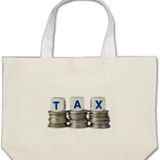Nederland recently became the latest local government to enact a new tax in violation of the Colorado Constitution by disingenuously calling it a fee.
The town’s board of trustees in May passed an ordinance imposing a 10-cent charge on paper and plastic disposable bags used to carry purchases at point of sale at “any public commercial business engaged in the sale of personal consumer goods, household items, or groceries to customers who use or consume such items.”
![]() Proponents call this bag charge a fee. But with even a little scrutiny, the ordinance is obviously a tax rather than a fee. The difference between the two is hugely significant. Fees can be passed by elected representatives, while under Colorado’s Taxpayer’s Bill of Rights (TABOR), new taxes must be approved by voters through the ballot.
Proponents call this bag charge a fee. But with even a little scrutiny, the ordinance is obviously a tax rather than a fee. The difference between the two is hugely significant. Fees can be passed by elected representatives, while under Colorado’s Taxpayer’s Bill of Rights (TABOR), new taxes must be approved by voters through the ballot.
Here’s what the Clorado Supreme Court had to say about the difference between a fee and a tax in the 2008 case Barber v. Ritter:
If the language discloses that the primary purpose for the charge is to finance a particular service utilized by those who must pay the charge, then the charge is a “fee.” On the other hand, if the language states that a primary purpose for the charge is to raise revenues for general governmental spending, then it is a tax.
The drafters of the ordinance were careful to include that “No disposable bag fees collected in accordance with this chapter shall be used only for general municipal or governmental purposes or spending.”
This apparently is Nederland’s clumsy justification, based on at least one part of the Supreme Court’s definition, that the bag charge isn’t a tax.
But that alone doesn’t magically make a tax a fee.
The ordinance goes on to list numerous, and often vague, city activities that can be funded with the new revenue, including studies, education campaigns, recycling equipment purchase and installation, community cleanups, and a public website
So while the money might not be used for general government spending, it can be used quite broadly, and “without limitation.” This hardly satisfies the fee requirement that the charge be used to “finance a particular service utilized by those who must pay the charge…”
The bag tax money is also going to be used to “provide reusable bags to residents and visitors.”
In other words, among many other things, the town will be using the money paid by people using disposable bags to “provide” reusable bags to people who aren’t paying the cost; a redistributive give-a-way program on (literally) someone else’s dime.
This is completely contrary to the “particular service utilized by those who must pay the charge” fee definition. How is this not a tax?
Moreover, what Nederland politicians are calling a fee is actually treated the same as a sales tax in both its collection from the consumer and its remittance to the town. Like with a tax, stores are required to collect the money from customers at the point of purchase. Like with a tax, stores keep a portion (five cents of each ten cents collected) of the money collected to offset the cost of complying with the law. Like with a tax, there are penalties and interest charges for stores failing to file and remit on time.
To call a charge that so closely resembles a retail sales tax a fee demands on a convoluted and insultingly obvious attempt to redefine the traditional understanding of the difference  between a fee and a tax.
between a fee and a tax.
In fact, there has been a fair amount of pushback on this bag tax bait-and-switch over the last couple years.
In 2013, Durango’s bag tax disguised as a fee was repealed at the ballot through citizens’ initiative.
In Ft. Collins in 2014, city council went ahead and repealed a bag tax disguised as a fee after citizens gathered enough signatures to put the ordinance on the ballot.
And earlier this year in Denver, a proposed bag tax masquerading as a fee was pulled by its city council sponsor after a veto threat from the mayor.
While the amount of the tax may seem small, the stakes are quite high. If politicians in Denver, Durango, Ft. Collins, and now Nederland, or anywhere else in Colorado, can bypass voters by simply calling what is obviously a tax a fee instead, then there are really no longer any meaningful limits on the ability of Colorado governments to reach into taxpayers’ pockets.
Mike Krause directs the Local Colorado Project at the Independence Institute, a free market think tank in Denver.


